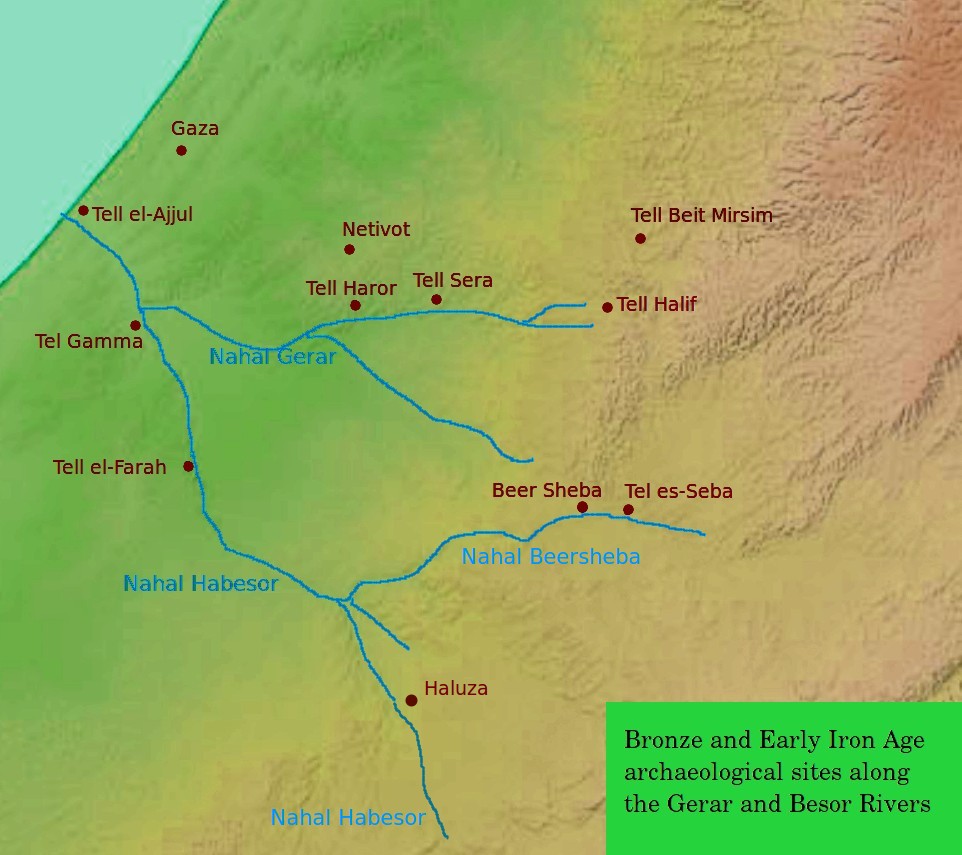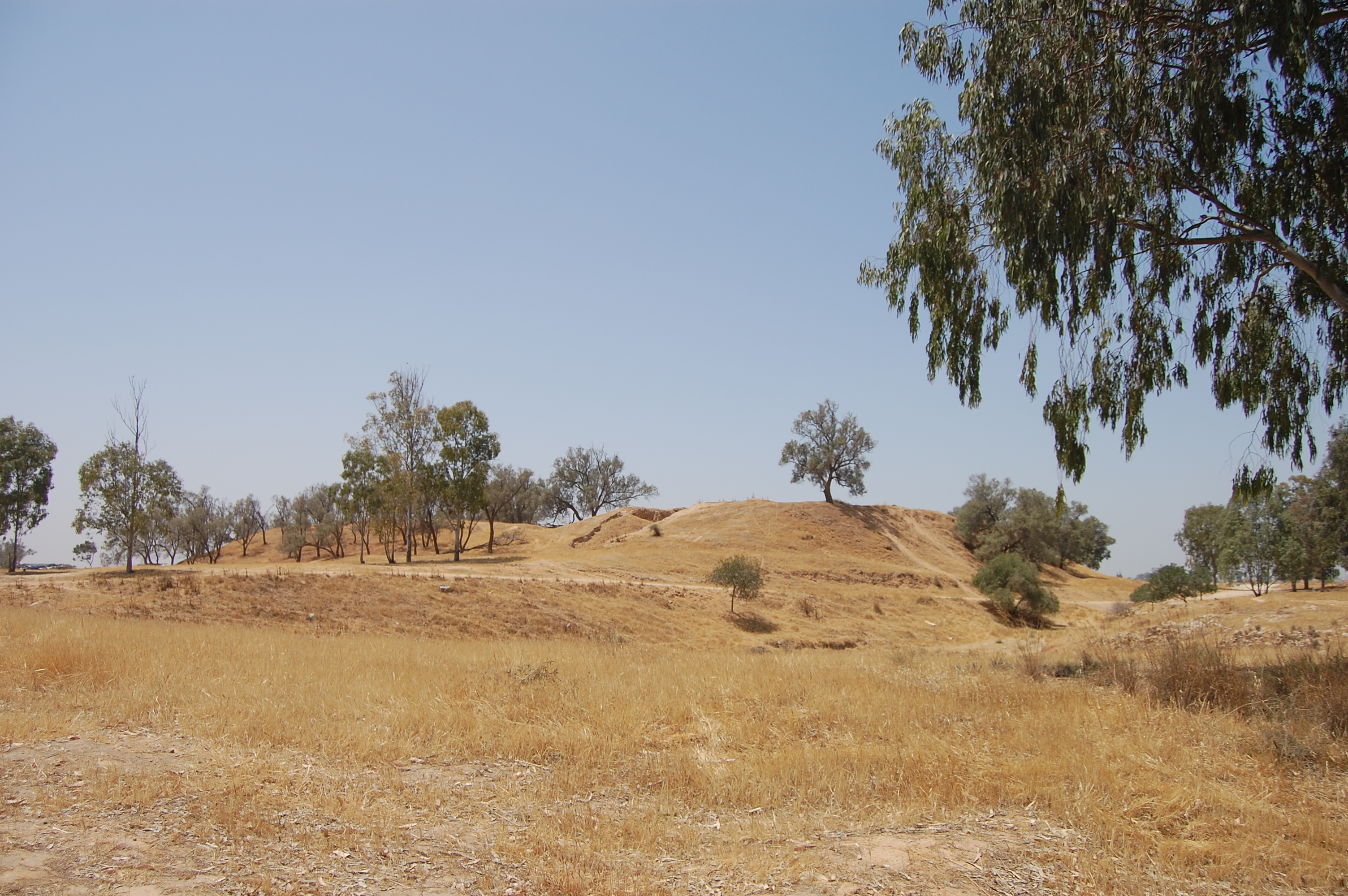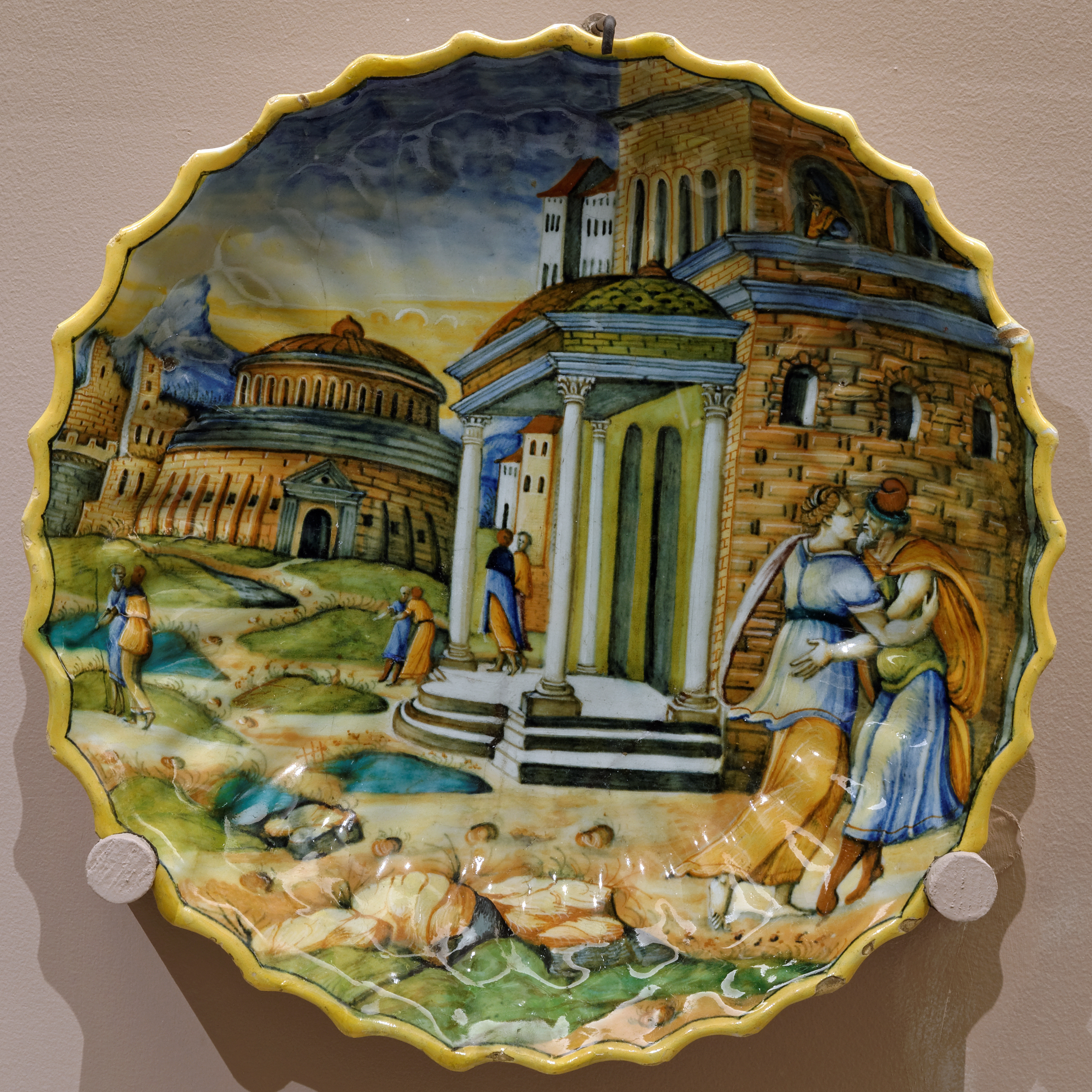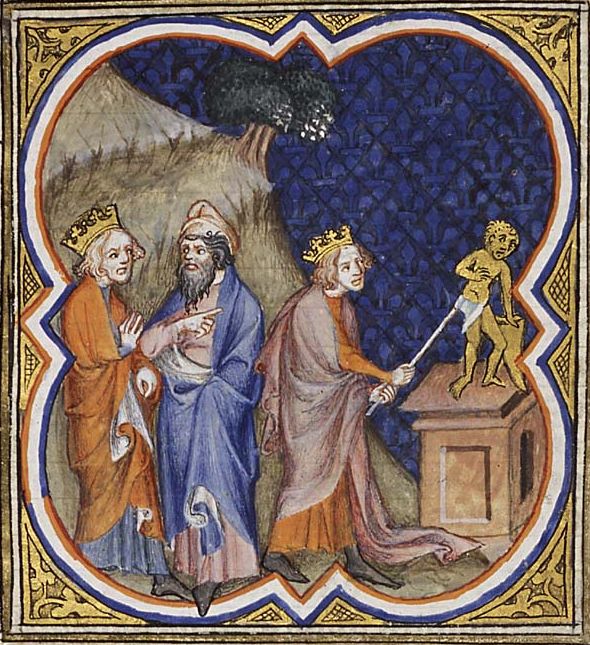|
Gerar
Gerar ( ''Gərār'', "lodging-place") was a Philistine town and district in what is today south central Israel, mentioned in the Book of Genesis and in the Second Book of Chronicles of the Hebrew Bible. Identification According to the International Standard Bible Encyclopedia, the biblical ''valley of Gerar'' () was probably located in the area of a valley known in Arabic as Wady Sheri'a, and in Modern Hebrew as Nahal Gerar. Most commentators see the mound of Tel Haror (Hebrew) or Tell Abu Hureyra (Arabic) as representing the ancient Gerar. Some older commentaries, such as Smith's Bible Dictionary, stated simply that Gerar was located "south of Gaza". Also, a ninth century rabbinical source (Saadia Gaon) identified Gerar with Haluza, located along the Besor River in the Negev.Rabbi Saadia Gaon's Judeo-Arabic Translation of the word Gerar (Judeo-Arabic: אלכ'לוץ = ''al-Khalūṣ'') in the Pentateuch (''Tafsir''), s.v. Genesis 10:19, Genesis 20:2, Genesis 26:17, 20. On Haluza' ... [...More Info...] [...Related Items...] OR: [Wikipedia] [Google] [Baidu] |
Nahal Gerar
Nahal Gerar, also ''Nachal Grar'' ( he, נחל גרר) is a wadi in Israel, in the Negev desert. Its Arabic name is Wadi esh-Sheri'a (also Wady el Sharia and other variations). Along this wadi, there are several important ancient Bronze Age archaeological sites. During the Early Iron Age this was an area of Philistine settlement. Geography Nahal Gerar begins on the border between the northern Negev and the southwest foothills of Judaean Mountains, near the village of Lahav (ancient site of Tel Halif). Then the wadi flows west near the city of Lehavim, and along the southern edge of a large Bedouin town of Rahat. Then it flows west along the northwestern edge of the Negev towards the town of Netivot, an agricultural area. Near the village of Re'im, it flows into Nahal Besor, of which it is the main affluent. Nature reserve The lower river area is now part of the Eshkol National Park, a nature reserve used by tourists. Forest have been replanted there, and hiking trails developed ... [...More Info...] [...Related Items...] OR: [Wikipedia] [Google] [Baidu] |
Tel Haror
Tel Haror (Hebrew Hebrew (; ; ) is a Northwest Semitic language of the Afroasiatic language family. Historically, it is one of the spoken languages of the Israelites and their longest-surviving descendants, the Jews and Samaritans. It was largely preserved ... name) or Tell Abu Hureyra (Arabic name; also spelled Hureira and Hareira), also known as ''Tel Heror'', is an archaeological site in the western Negev Desert, Israel, northwest of Beersheba, about 20 km east of the Mediterranean Sea, situated on the north bank of Nahal Gerar, Wadi Gerar, a wadi known in Arabic as Wadi esh-Sheri'a. During the List of archaeological periods (Levant), Middle Bronze Age II it was one of the largest urban centres in the area, occupying about 40 acres. The city contains substantial remains of History of Israel#Bronze and Iron Ages, Middle Bronze Age II through to Persian-period settlement strata. Excavations W.F. Albright suggested as early as 1924 that there was a Cush (Bible), ... [...More Info...] [...Related Items...] OR: [Wikipedia] [Google] [Baidu] |
Tell Jemmeh
Tell Jemmeh ( ar, تل جمه), also known in Hebrew as Tel Gamma (תל גמה) or Tel Re'im (תל רעים), is a prominent mound, or tell (archaeology), tell, located in the region of the northwestern Negev and the southern Israeli coastal plain, coastal plain of Israel, about 12 km south of Gaza City, Gaza, bounded by the kibbutz of Re'im 2 km to the east, and the kibbutz of Kisufim 6 km to the west, and is 9 km east of the Mediterranean Sea, Mediterranean coast. The site is located at the confluence of two streams, Nahal Besor and Nahal Gerar. Both have changed their course in this area many times throughout history. Re'im is a modern secular kibbutz town located to the east nearby. Tell Jemmeh is one of three major sites along the Besor Stream along with Tell el-Far'ah (South), Tell el-Far'ah and Tell el-Ajjul. Some archaeologists identify the Besor Stream with the "Brook of Egypt" found in the Hebrew Bible (Torah). There are also a number of ancient sites ... [...More Info...] [...Related Items...] OR: [Wikipedia] [Google] [Baidu] |
Besor
The Besor ( he, נחל הבשור, ''Nahal HaBesor'') is a wadi in southern Israel. The stream begins at Mount Boker (near Sde Boker), and spills into the Mediterranean Sea near Al-Zahra in the Gaza Strip, where it is called Wadi Gaza ( ar, وادي غزة, Wadi Ghazzeh), also spelled Wadi Ghazza or Wadi 'Azza. Further upstream it is marked as Wadi esh-Shallaleh on the 1878 Survey of Western Palestine map. There are several important archaeological sites located in this area. The stream is the largest in the northern Negev, and together with its largest tributaries, the Nahal Gerar, and the Beersheba stream, reaches as far east into the desert as Sde Boker, Yeruham, Dimona and Arad/Tel Arad. The Gaza section of the Coastal Aquifer is the only significant source of water in the Gaza Strip. The Wadi Gaza runs through a wetland, the Gaza Valley, and as of 2012 it is used as a wastewater dump. History In the Old Testament Besor was a ravine or brook in the extreme south-west of ... [...More Info...] [...Related Items...] OR: [Wikipedia] [Google] [Baidu] |
Abimelech
Abimelech (also spelled Abimelek or Avimelech; ) was the generic name given to all Philistine kings in the Hebrew Bible from the time of Abraham through King David. In the Book of Judges, Abimelech, son of Gideon, of the Tribe of Manasseh, is proclaimed king of Shechem after the death of his father. Etymology The name or title ''Abimelech'' is formed from Hebrew words for "father" and "king," and may be interpreted in a variety of ways, including "Father-King", "My father is king," or "Father of a king." In the Pentateuch, it is used as a title for kings in the land of Canaan. Abimelech can be translated in Arabic as well into "My father is king", "My father is owner" or "Father of a king," where () means father or my father while () means king or () for owner. At the time of the Amarna tablets (mid-14th century BC), there was an Egyptian governor of Tyre similarly named Abimilki, Abimelech of Gerar Abimelech was most prominently the name of a polytheistic king of G ... [...More Info...] [...Related Items...] OR: [Wikipedia] [Google] [Baidu] |
Haluza
The ancient city of Halasa or Chellous ( gr, Χελλοὺς), Elusa () in the Byzantine period, was a city in the Negev near present-day Kibbutz Mash'abei Sadeh that was once part of the Nabataean Incense Route. It lay on the route from Petra to Gaza.Carta's Official Guide to Israel, 1983. Today it is known as Haluza ( he, חלוצה), and during periods of Arab habitation it was known as al-Khalūṣ ( ar, الخلوص; Early Muslim period) and Al-Khalasa (; 20th century). In the 5th century it was surrounded by vineyards and was famous for its wines. Due to its historic importance, UNESCO declared Haluza a World Heritage Site along with Mamshit, Avdat and Shivta. Name in ancient sources The city is called 'Chellous' (Χελλοὺς) in the Greek text of Judith, i, 9 (seJdt 1:9in NABRE), a work probably dating to the 1st century BCE. It is also mentioned in the 2nd century CE by Ptolemy, Peutinger's Table, Stephanus Byzantius (fl. 6th century; as being formerly in t ... [...More Info...] [...Related Items...] OR: [Wikipedia] [Google] [Baidu] |
Vayeira
Vayeira, Vayera, or ( — Hebrew language, Hebrew for "and He appeared," the incipit, first word in the parashah) is the fourth weekly Torah portion (, ''parashah'') in the annual Judaism, Jewish cycle of Torah reading. It constitutes . The parashah tells the stories of Abraham's three visitors, Abraham's bargaining with God in Judaism, God over Sodom and Gomorrah, Lot (Bible), Lot's two visitors, Lot's bargaining with the Sodomites, Lot's flight, the destruction of Sodom and Gomorrah, how Lot's daughters became pregnant by their father, how Abraham once again Wife–sister narratives in the Book of Genesis, passed off his wife Sarah as his sister, the birth of Isaac, the expulsion of Hagar (Bible), Hagar, disputes over wells, and the binding of Isaac (, the ''Akedah''). The parashah has the most words (but not the most letters or Chapters and verses of the Bible, verses) of any of the weekly Torah portions in the Book of Genesis, and its word-count is second only to Parashat Nas ... [...More Info...] [...Related Items...] OR: [Wikipedia] [Google] [Baidu] |
Beersheba
Beersheba or Beer Sheva, officially Be'er-Sheva ( he, בְּאֵר שֶׁבַע, ''Bəʾēr Ševaʿ'', ; ar, بئر السبع, Biʾr as-Sabʿ, Well of the Oath or Well of the Seven), is the largest city in the Negev desert of southern Israel. Often referred to as the "Capital of the Negev", it is the centre of the fourth-most populous metropolitan area in Israel, the eighth-most populous Israeli city with a population of , and the second-largest city in area (after Jerusalem), with a total area of 117,500 dunams. The Biblical site of Beersheba is Tel Be'er Sheva, lying some 4 km distant from the modern city, which was established at the start of the 20th century by the Ottoman Turks. The city was captured by the British-led Australian Light Horse in the Battle of Beersheba during World War I. The population of the town was completely changed in 1948–49. ''Bir Seb'a'' ( ar, بئر السبع), as it was then known, had been almost entirely Muslim and Christian, and wa ... [...More Info...] [...Related Items...] OR: [Wikipedia] [Google] [Baidu] |
Book Of Genesis
The Book of Genesis (from Greek ; Hebrew: בְּרֵאשִׁית ''Bəreʾšīt'', "In hebeginning") is the first book of the Hebrew Bible and the Christian Old Testament. Its Hebrew name is the same as its first word, ( "In the beginning"). Genesis is an account of the creation of the world, the early history of humanity, and of Israel's ancestors and the origins of the Jewish people. Tradition credits Moses as the author of Genesis, as well as the books of Exodus, Leviticus, Numbers and most of Deuteronomy; however, modern scholars, especially from the 19th century onward, place the books' authorship in the 6th and 5th centuries BC, hundreds of years after Moses is supposed to have lived.Davies (1998), p. 37 Based on scientific interpretation of archaeological, genetic, and linguistic evidence, most scholars consider Genesis to be primarily mythological rather than historical. It is divisible into two parts, the primeval history (chapters 1–11) and the ancestr ... [...More Info...] [...Related Items...] OR: [Wikipedia] [Google] [Baidu] |
Abraham
Abraham, ; ar, , , name=, group= (originally Abram) is the common Hebrew patriarch of the Abrahamic religions, including Judaism, Christianity, and Islam. In Judaism, he is the founding father of the special relationship between the Jews and God; in Christianity, he is the spiritual progenitor of all believers, whether Jewish or non-Jewish; and in Islam, he is a link in the chain of Islamic prophets that begins with Adam (see Adam in Islam) and culminates in Muhammad. His life, told in the narrative of the Book of Genesis, revolves around the themes of posterity and land. Abraham is called by God to leave the house of his father Terah and settle in the land of Canaan, which God now promises to Abraham and his progeny. This promise is subsequently inherited by Isaac, Abraham's son by his wife Sarah, while Isaac's half-brother Ishmael is also promised that he will be the founder of a great nation. Abraham purchases a tomb (the Cave of the Patriarchs) at Hebron to be S ... [...More Info...] [...Related Items...] OR: [Wikipedia] [Google] [Baidu] |
Asa Of Judah
Asa (; el, Ασά; la, Asa) was, according to the Hebrew Bible, the third king of the Kingdom of Judah and the fifth king of the Davidic line, House of David. The Hebrew Bible gives the period of his reign between 40–41 years. His reign is dated between 913–910 BC to 873–869 BC. He was succeeded by Jehoshaphat, his son (by Azubah (mother of Jehoshaphat), Azubah). According to Edwin R. Thiele, Thiele's chronology, when Asa became very ill, he made Jehoshaphat coregent. Asa died two years into the coregency. Asa was zealous in maintaining the traditional worship of God, and in rooting out idolatry, with its accompanying immoralities. After concluding a battle with Zerah of Ethiopia in the 10th year of his reign, there was peace in Judah () until the 36th year of Asa's reign (). In his 36th year he was confronted by Baasha of Israel, Baasha, king of Kingdom of Israel (Samaria), Israel. He formed an alliance with Ben-Hadad I, king of Aram Damascus, and using a monetary bribe, ... [...More Info...] [...Related Items...] OR: [Wikipedia] [Google] [Baidu] |
Isaac
Isaac; grc, Ἰσαάκ, Isaák; ar, إسحٰق/إسحاق, Isḥāq; am, ይስሐቅ is one of the three patriarchs of the Israelites and an important figure in the Abrahamic religions, including Judaism, Christianity, and Islam. He was the son of Abraham and Sarah, the father of Jacob and Esau, and the grandfather of the Twelve Tribes of Israel, twelve tribes of Israel. Isaac's name means "he will laugh", reflecting the laughter, in disbelief, of Abraham and Sarah, when told by God that they would have a child., He is the only patriarch whose name was not changed, and the only one who did not move out of Canaan. According to the narrative, he died aged 180, the longest-lived of the three patriarchs. Etymology The anglicized name "Isaac" is a transliteration of the Hebrew name () which literally means "He laughs/will laugh." Ugaritic language, Ugaritic texts dating from the 13th century BCE refer to the benevolent smile of the Canaanite religion, Canaanite deity El (deit ... [...More Info...] [...Related Items...] OR: [Wikipedia] [Google] [Baidu] |







.jpg)

